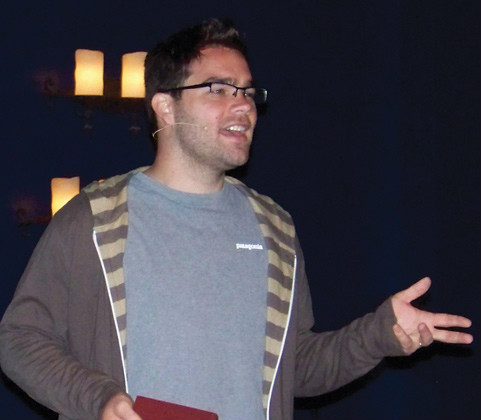 Below are excerpts from an interview with Josh Carney, teaching pastor at University Baptist Church in Waco, near Baylor University. Good food for thought about the role of the church and the role of the pastor in leading the church.
Below are excerpts from an interview with Josh Carney, teaching pastor at University Baptist Church in Waco, near Baylor University. Good food for thought about the role of the church and the role of the pastor in leading the church.
What other parts of being in ministry have been challenging?
Working out how specifically to pursue our mission as a church. It hasn't been difficult for us to identify how God would have us be kingdom people in the world. What's been harder is determining the best way to accomplish this. For example, we might all agree that the kingdom that Jesus proclaims compels us to work to alleviate suffering. But what is the best, most responsible way to do this?
Is the debate about prioritizing what kinds of suffering to address? Or about direct service versus systemic change?
Both. Because we're close to a university, we've had to learn that on just about every issue-theological or otherwise-our community is full of opinions that are both extremely educated and extremely diverse. A lot of people have had experiences that shape the way they see the world-and what they think the solutions for the world's ills are.
The challenge is to engage and serve the world in a distinctively kingdom way. Instead most of us quickly let our political ideology dictate how we do this. We need to continually pray that the Holy Spirit would illuminate the countercultural love option that Jesus offers-the third way that comes through gospel imagination.
On the basis of your ministry experience so far, what would you change about your seminary curriculum?
That's an intriguing question. First, let me express my deep appreciation for the many things that Truett is doing right-as well as to acknowledge that some changes would simply require more funding and a larger faculty.
A professor of mine says that the seminary curriculum's breadth is both its strength and its weakness. I can't think of one class I took that hasn't proved helpful. But I do think that seminaries need to continue to examine the ever-changing landscape of ministry-and to tailor programs that give students more chances to specialize.
I didn't have an ethics class at Truett. That would have been helpful-especially for me as a teaching pastor, a role that involves a lot of epistemological activity. I also wish I had taken a hermeneutics class. It's one thing to study the historical-critical method and affirm it as the proper place to begin. But what's the best way to move from exegetical findings to situational context? Postmodernism has reached deep into all facets of life, making a Christ-centered, pneumatologically driven hermeneutic all the more important.
What does being a "leader" mean? Has your understanding evolved?
My friend and copastor Craig Nash recently articulated something I had long been feeling: an aversion to the word leadership. Christians are often eager to develop leadership models and analyze leadership styles; it's an area in which the church continues to follow the world's lead. Lead pastors who can run an organization effectively are tagged as good leaders.
Again, the problem is that we've lost our gospel imagination. The CEO kind of pastor may be an effective leader, but I'm not sure this is how the church is to be led. I think good leadership is defined by Jesus with a towel in hand, washing feet. And that's also each Christian's call. We are to be disciples who mimic Christ by loving self-sacrificially. What does this mean for pastoral leadership? It means that you pick up a cross and ask your congregation to come with you.
What developments would you like to see in your congregation's mission? In the wider church's?
I hope that the church-both our local expression and the larger one that we're part of-learns to be more creative. I feel that a lot of our problems come from a lack of imagination.
When the pesky Pharisees try to trap Jesus by asking if he thinks they ought to pay the temple tax, he offers one of those answers that turns the question on its head. Caesar's image is on the money, so it belongs to him. Render unto Caesar what is Caesar's and to God what is God's. But what has God's image on it? Well, we do. The creation testifies about God. In fact, the creation exists because God breathed it, and all of this creation belongs to God.
Jesus both critiqued the world and loved it. He was never satisfied to give a response that lived within the parameters of the question. He found a better way, a third way to respond-and the world stood in awe as it saw God move within history. Our lack of this kind of imagination is evident in our politics, in our wars and unfortunately even in the church. But this can change. My prayer is that Christians will be imaginative Jesus people.
Describe an experience that made you think, "This is what church is all about."
A lot of what I've said so far is about the church's immanent ministry, how it engages the world. But this has to be rooted in transcendent ministry, in the worshiping community.
One Sunday at UBC the last song the band played was the doxology. It was time to make the transition to the learning portion of worship, but something within me was profoundly content to sit in God's presence. I found myself standing in the peace of God which transcends understanding, filled with an inexpressible joy and overwhelmed by love.
All the community gardens, mission trips, relationships with local school districts and low-income housing complexes-if all that work is not about this kind of moment, if it's not about participating in the divine dance that has been going on for all eternity, then it misses the point. We are because God is.
http://www.christiancentury.org/article/2011-06/ministry-21st-century
















